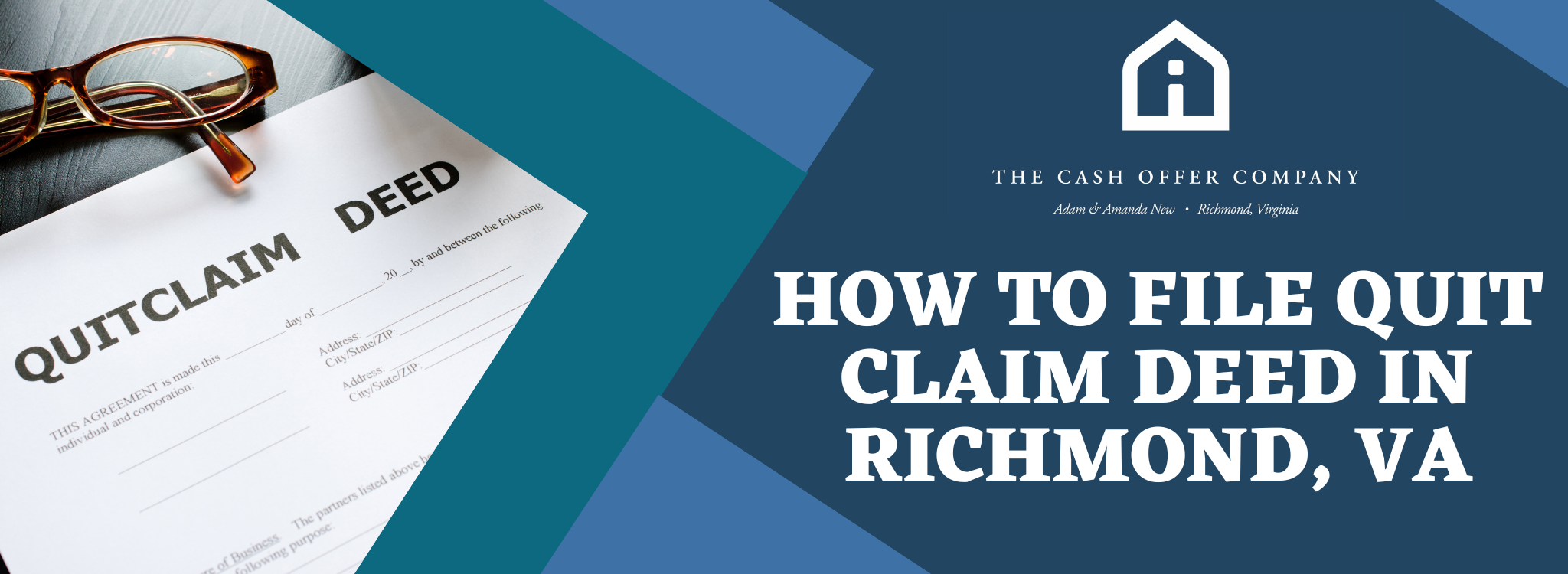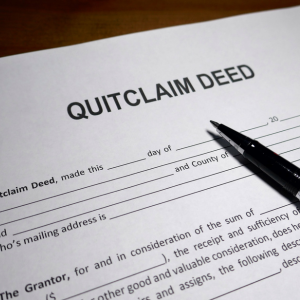
How Does a Quit Claim Deed Function in Richmond, VA?
A quit claim deed is a legal instrument passing Richmond, Virginia’s property ownership. This kind of deed lets the grantor, the person selling the property, part with their interest to the grantee, the person getting it. Unlike other actions, a quit claim deed offers no warranties against other claims or proof of title validity. Usually used to settle conflicts among family members or co-owners when there is trust between them, it is
What Role Do the Grantor and Grantee Play?
Under a quit claim deed transaction, the grantor and grantee have particular responsibilities:

- Grantor: This individual or company forfeits their property rights and ownership. The grantor has to make it abundantly evident that all rights to the property are being released.
- Grantee: The person or entity receiving the property rights from the grantor is known as the grantee. Knowing the grantor provides no guarantees regarding the property’s title, the grantee accepts it.
Both sides of the real estate transaction must accurately complete the deed and submit it to the local government office to make it official.
Are There Any Limitations in a Quit Claim Deed?
Certain restrictions and hazards surround quit claim deeds. Crucially important factors include:
- No Warranties: These acts do not offer warranties regarding the state of the title. The grantee takes the property “as-is,” implying that current liens or problems still exist.
- Title Risks: Without title guarantees, the grantee runs the danger of having unreported claims against the property. Before the purchase, a careful title search can help control this risk.
- Legal Implications: One must know the legal effect of a quit claim deed. Consulting a real estate attorney will help to guarantee adherence to legal norms and safeguard the interests of both sides.
Using a quit claim deed to satisfy all legal requirements and safeguard the interests of both sides, the The Cash Offer Company advises seeing a professional.
Step-by-Step Process to File a Quit Claim Deed in Richmond, VA
Where Do You Obtain the Necessary Forms?
You need the right legal forms to start filing a quit claim deed in Richmond, VA. These forms are available for download on websites designed explicitly for Virginia quit claim deeds. You can also visit the land records office in Richmond, VA, to get the paperwork needed for property deed filing. Ensure you know Richmond’s specific requirements for deed filing to prevent delays or issues with your application.
What Are the Filing Procedures at the Richmond Circuit Court?

Filing a quitclaim deed at the Richmond Circuit Court involves these main steps:
- Visit the Richmond Courthouse: Go to the Richmond Courthouse, where the circuit court is located.
- Meet with the Court Clerk: Head to the court clerk’s office. The clerk will guide you on the procedures for a quit claim at the Richmond, VA, courthouse and check your documents.
- Execute the Quit Claim Deed: Ensure the deed’s execution meets all legal requirements, such as having the necessary signatures and notarization.
- File the Deed: Submit the executed quit claim deed to the court clerk. They will help you file the documents properly.
- Record the Deed: The recording process updates the land records with your new property details.
Following these steps carefully will ensure your quit claim deed is processed correctly, enabling a smooth transition of property rights. Consider consulting a legal professional if you have questions or need more help.
Legal Implications of Using a Quit Claim Deed in Richmond
One instrument available to be used to transfer property interest between parties is a quitclaim deed. The execution of such a deed in Richmond, Virginia, has specific legal consequences. Unlike other kinds of deeds, a quitclaim deed just passes the property the grantor owned at the time of the transfer; it does not ensure a clear title. Should any liens or claims already exist on the property, the grantee is liable for them. Before proceeding with the transaction, anyone considering a property transfer should fully grasp the restrictions and possible hazards connected to a quitclaim deed.
Should You Consult a Real Estate Attorney?

Regarding Richmond’s property transaction management, one would be wise to consult a real estate attorney. An informed attorney can help you negotiate the complex facets of property law and the use of a quitclaim deed. They can confirm that all legal processes are followed to protect your rights as the owner of the property by verifying the title status of it. When you consult a professional attorney, it helps to lower risks and guide decisions on real estate. Richmond real estate lawyers with years of experience and a concentration on property law are ready to offer you professional advice that fits your needs.
What Are the Risks Involved in Using a Quit Claim Deed?
A quitclaim deed puts you in many different dangers, including the following:
- Title Issues: Quitclaim deeds offer no guarantee that the title is free from flaws. Should undisclosed claims or liens exist, this can lead to ownership conflicts.
- Lack of Protection: Purchasing property using a quitclaim deed could cause one to assume any existing obligations since the title is not guaranteed.
- Legal Implications: If you neglect to give the matter careful thought, you could face unexpected legal concerns about property ownership and rights in Richmond, Virginia.
A real estate attorney’s services help reduce these risks by conducting a thorough title search and offering direction on the proper course of action. This guarantees that your ownership rights are protected and that the legal handling of your property is followed.
Differences Between Quit Claim Deeds and Warranty Deeds in Virginia
Knowing the differences between warranty and quitclaim deeds will benefit you in a Virginia property transaction. Essential in passing property ownership and offering differing degrees of protection.
How Do They Affect Property Ownership Transfer?
The type of deed you choose will significantly affect the rights bestowed upon the grantee upon a change of property ownership: warranty or quitclaim.

- Quitclaim Deeds: A quitclaim deed like this passes the grantor’s interest in the property free from warranties or guarantees. Should title issues surface, the grantee is not protected.
- Warranty Deeds: Warranty deeds for the title provide strong guarantees from the grantor and are free of encumbrances. They show that the grantor has a clear title and can assign whole ownership to the grantee.
These acts produce rather different legal outcomes. Warranty deeds provide more protection, even if quitclaim deeds can be used in simpler situations like passing property between family members.
Which Situations Are Best Suited for Each Type of Deed?
The conditions and degree of risk of the real estate transaction will decide which quitclaim or a warranty deed one prefers.
- Quitclaim Deeds:
- Low-risk transfers—such as those between relatives or title corrections—call for this.
- It lets one add or remove someone’s name from a title.
- Warranty Deeds:
- Recommended for most real estate deals involving unrelated people.
- Provides the grantee with a strong defense against title claims.
Speaking with a legal professional is always smart to ensure the transaction fits your long-term goals and risk tolerance. Legal advice will help you manage risks and protect your interests from difficult property problems.
Knowing every type of deed helps Virginia property owners choose how to handle ownership changes. Should more help be required, the The Cash Offer Company offers tools to enable you to negotiate the process effectively.
Frequently Overlooked Aspects When Filing a Quit Claim Deed in Richmond, VA
What Common Mistakes Should Be Avoided?
When you submit a quit claim deed in Richmond, Virginia, try to prevent common mistakes that complicate your property transfer. Recall these crucial concepts:
- Document Errors: Check your records for typos or erroneous property information. The absence of information could render the deed void.
- Notarization Issues: Always have the deed signed correctly before a notary. A step missed can result in a rejection.
- Ignoring Legal Advice: Dealing with a legal expert will help to prevent unanticipated issues during the property transfer, as legal advice is often ignored otherwise.
- Overlooking Filing Fees: Pay all required fees on time. Unpaid fees allow one to postpone or cancel the filing.
See a legal practitioner for specific guidance about your situation.
How Can You Ensure Your Deed Is Properly Notarized and Recorded?

Notarize and correctly document your Richmond quit claim deed.
- Consult a Notary: Sign the deed before a qualified notary to ensure its legality.
- Visit the Richmond Courthouse: Turn in the notarized deed to the courthouse. See whether it meets every Virginia legal standard.
- Understand the Recording Process: Learn about how property records are kept to better understand the recording process. Then, sort all of your files correctly.
- Verify Document Completeness: Before you submit paperwork, be sure everything is accurate and complete. This helps stop delays resulting from partial filings.
Following these rules will ensure a flawless property transfer by helping your quit claim deed meet legal criteria for being correctly recorded. See local solicitors for more help.
FAQs:
How do I file a quit claim deed in Virginia?
To file a quit claim deed in Virginia, complete the correct deed form accurately. Ensure both the grantor and grantee sign it and have it notarized. Then, please submit it to the local county recorder’s office where the property is located. Filing fees apply, so check with your local office for cost details.
What are the requirements for recording a quit claim deed in Richmond, VA?
In Richmond, VA, a quit claim deed must include the property’s legal description and all parties’ names. It must be properly notarized and filed at the land records office in the Richmond courthouse to ensure the transfer is legally recognized.
Do I need an attorney to file a quit claim deed in Virginia?
It’s not mandatory to hire an attorney, but consulting one can be helpful, especially if you have questions about tax implications or legal concerns. Real estate lawyers can guide you and help protect your interests.
What is the difference between a quit claim deed and a warranty deed in Virginia?
A quit claim deed transfers whatever interest the grantor has in the property without warranties, offering no guarantee on the title’s status. A warranty deed, however, provides assurances from the grantor about the validity of the title, protecting the grantee against future claims.
How is property ownership transferred using a quit claim deed in Richmond, VA?
Property ownership in Richmond, VA, is transferred by completing the quit claim deed form accurately, having both parties sign it, and getting it notarized. Submit it to the county recorder’s office to record and officially transfer ownership.
What legal implications should I consider when filing a quit claim deed in Virginia?
Consider potential impacts on your mortgage, taxes, and any liens on the property. Consulting a real estate lawyer can help address these issues and ensure all necessary legal steps are followed.
Can a quit claim deed be used in a divorce settlement in Virginia?
Yes, a quit claim deed is often used in divorce settlements in Virginia to transfer property from one spouse to another. This can simplify changing ownership, but it is advised to work with attorneys to cover all legal aspects.
How can I verify if a quit claim deed has been recorded correctly in Richmond, VA?
To verify if a quit claim deed is recorded in Richmond, VA, you can search at the Richmond property records office or check public records online if available. This confirms the deed has been officially recorded, ensuring the transfer is valid.
Key Insights
- To file a quit claim deed in Richmond, VA, one must understand the local requirements and the role of a notary public.
- Get guidance on property ownership transfer in Richmond and why recording deeds at the courthouse is legally important.
- Choose the right document to learn the differences between quit claim deeds and warranty deeds in Virginia.
- When using a quit claim deed for property transfer in Virginia, consult an attorney about tax implications and legal compliance.
- We assist with preparing quit claim deed forms that meet Virginia’s requirements and are properly notarized.
- Knowing how to file a quit claim deed is crucial for managing property transfers when dealing with estate planning or probate issues.
- A quit claim deed helps transition property titles smoothly in divorce or family estate matters.
- Please review the FAQs about quit claim deeds in Virginia for common questions on fees, legal implications, and submitting documents.
- Follow the step-by-step process for filing a quit claim deed in Richmond, including needed documents and witness signatures.
- Seek professional legal counsel for complex quit claim deed issues to ensure filings comply with Virginia laws.
This information applies to Virginia and its cities, including Richmond, Virginia Beach, Chesapeake, Suffolk, and Newport News. For more details, please call us at (804) 215-4004 or visit our website at The Cash Offer Company.


